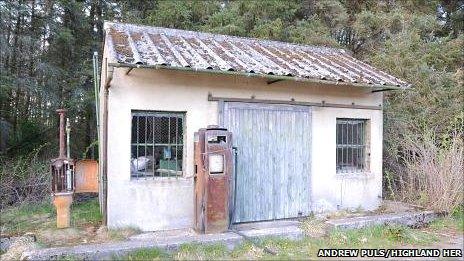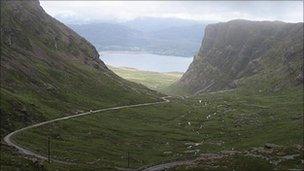Warnings of a rural 'fuel desert' in Scotland
- Published

Some filling stations shut down in the past have been listed on a record of historic sites
A motor industry lobby group has forecast filling stations disappearing completely from large parts of Scotland by the end of the decade.
Brian Madderson, of the Retail Motor Industry Federation, said rural forecourts needed government help.
The BBC has reported that a planned discount on fuel in remote rural areas will not be in the Budget in March.
Chief Secretary to the Treasury, Danny Alexander announced plans for a pilot scheme in October.
But a Treasury source said "informal discussions" were still taking place between EU and British officials.
The UK needs EU permission to charge different fuel duty rates around the country. Ministers hope to make a formal request after the Budget.
'Complete desert'
Fuel prices have been on the rise across Scotland over the past few weeks, with some of the highest prices in rural areas.
On Shetland, unleaded petrol costs up to £1.41 per litre and £1.46 for diesel, according to Petrolprice.com.
The website has reported diesel costing £1.44 on Orkney, while on the Western Isles, the highest price for unleaded was £1.40 and £1.43 for diesel.
In Caithness unleaded petrol costs up to £1.34 and £1.40 for diesel.
Petrolprice.com has also reported the highest costs for fuel in Oban and Dumfries being £1.29 and £1.33.
Mr Madderson, chairman of the motor federation's petroleum division, said rural filling stations were a community asset.
He said: "If we don't look after and protect our rural filling stations we can see a position by the end of the decade where you will only get fuel from the motorway side, hyper markets in town centres and some big sites on A roads.
"That is going to mean a complete desert across large swathes of Scotland."

Applecross has two automatic pumps ending a 36-mile round trip for fuel
Stewart Nicol, chief executive of Inverness Chamber of Commerce, said there was a case for government support for rural stations.
He said: "I would judge that rural fuel stations would largely close with one or two notable exceptions.
"I think there is certainly a case for some sort of support going into businesses in very remote and rural locations.
"That probably needs to be done on an individual case by case basis."
Local authority worker Marian MacLeod, from Harris, travels about 50 miles a day to and from work.
She said she has seen the price she pays for petrol rise by £20 a week over the last 12 months, making her monthly outgoings on fuel £80 more expensive than a year ago.
Ms MacLeod said: "An £80 rise in one month is nearly a weekly wage, which I find quite disturbing."
She said using public transport was not convenient for her journey.
In 2009, a report, external commissioned by Highland Council suggested about half of the rural filling stations in the north of Scotland and the islands could close within 10 years.
The survey said as many as 114 of the area's current network of 231 petrol stations could shut across the Highlands, islands, Moray and Argyll.
The worst affected area was said to be Orkney, where 17 of the 28 filling stations were described as at risk.
Consultants Experian Catalist, who carried out the survey, said the closure risks were due mostly to low profitability.
In 2007, unmanned 24-hour self-service fuel pumps were suggested by council officers as one way of halting the decline of small rural filling stations in the Highlands.
Applecross, in Wester Ross, started using two automatic pumps last year after residents secured funding to keep their station open.
The move ended drivers having to make a 36-mile round trip to the nearest petrol station.
For other communities, such as Brora, Dornoch and Nairn, closed down filling stations have become relics listed on Highland Council's Historic Environment Record database alongside Neolithic remains.
- Published18 January 2011
- Published22 July 2010